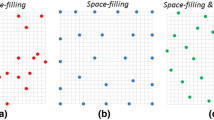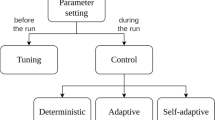Abstract
Genetic algorithms (GAs) have emerged as powerful solution searching mechanisms, especially for nonlinear and multivariable optimization problems. Generally, it is time-consuming for GAs to find the solutions, and sometimes they cannot find the global optima. In order to improve their search performance, we propose a fast GA algorithm called momentum GA, which employs momentum offspring (MOS) and constant range mutation (CRM). MOS, which generates offspring based on the best individuals of current and past generations, is considered to have the effect of fast searching for the optimum solutions. CRM is considered to have the ability to avoid the production of ineffective individuals and maintain the diversity of the population. In order to verify the performance of our proposed method, a comparison between momentum GA and the conventional mean will be implemented by utilizing optimization problems of two multivariable functions and neural network training problems with different activation functions. Simulations show that the proposed method has good performance regardless of the small values of the population size and generation number in the GA.
Similar content being viewed by others
References
Holland JH (1995) Adaptation in natural and artificial systems. MIT Press, Cambridge
Falkenauer E (1998) Genetic algorithms and grouping problems. Wiley, New York
Srinivas M, Patnaik LM (1994) Genetic algorithms: a survey. IEEE Comput, vol 27,Issue 6, 17–26
Bhattacharyya S, Troutt MD (2003) Genetic search over probability spaces. Eur J Operational Res 144:333–347
De Falco I, Cioppa AD, Tarantino E (2002) Mutation-based genetic algorithm: performance evaluation. Appl Soft Comput 1:285–299
Acan A, Altincay H, Tekol Y, et al. (2003) A genetic algorithm with multiple crossover operators for an optimal frequency assignment problem. 2003 Congress on Evolutionary Computation, CEC’ 03, IEEE, Canberra, Australia, vol 1, pp 256–263
Rasheed K (1999) Guided crossover: a new operator for a genetic-algorithm-based optimization. Proceedings of the 1999 Congress on Evolutionary Computation, CEC’ 99, IEEE, Washington, USA, vol 2, pp 1535–1541
Kinjo H, Oshiro N, Kurata K, et al. (2006) Improvement of searching performance of real-coded genetic algorithms by the use of biased probability distribution function and mutation (in Japanese). Trans SICE 42:581–590
Nakanishib H, Kinjo H, Oshiro N, et al. (2007) Searching performance of a real-coded genetic algorithm using biased probability distribution functions and mutation. Artif Life Robotics 11:37–41
Sexton RS, Gupta JND (2000) Comparative evaluation of genetic algorithms and backpropagation for training neural networks. Inf Sc 129:45–59
Author information
Authors and Affiliations
Corresponding author
About this article
Cite this article
Kinjo, H., Sam, D.C., Maeshiro, M. et al. Solution searching for multivariable optimization problems by a momentum genetic algorithm. Artif Life Robotics 12, 199–205 (2008). https://doi.org/10.1007/s10015-007-0467-3
Received:
Accepted:
Published:
Issue Date:
DOI: https://doi.org/10.1007/s10015-007-0467-3




